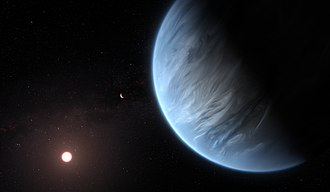
Written by Pallab Ghosh, Science Correspondent for the BBC News and Honorary President of the Association of British Science Writers.
The claim by the team at UCL about the habitability of a distant planet, K2-18b drew fierce criticism from rival astronomers over Twitter. They claim that it is too hot, too great a pressure and too poisonous to support life. And they say that it’s us science journalists and press officers to blame for the way they allege has been misreported.
It was reported as “potentially habitable” by all mainstream media because that is what the UCL team said several times and are continuing to say in response to the criticisms.
The lead author, the respected astronomer Prof Giovanna Tinetti told me in direct response to the criticisms:
‘’K2-18b cannot be classified as a mini-Neptune,” (as many critics were suggesting on Twitter. “It is more likely to be a planet with an interior of rock and ices. These types of planets, [are] sometimes called ‘ocean planets’.”
“Now, whether this planet really has an ocean at the surface or rock, we cannot tell with current observations, but having water in the atmosphere is a good start.”
She also asserted that habitability was a more complex issue than finding another Earth.
“The Earth really stands out in our own Solar System. It has oxygen, water and ozone. But if we find all that around a planet around a distant star we have to be cautious about saying that it supports life,” she said.
“This is why we need to understand not just a handful of planets in the galaxy but hundreds of them. And what we hope is that the habitable planets will stand out, that we will see a big difference between the planets that are habitable and the ones that are not.”
Many of the critics have blamed science journalists or the press officers who wrote the press release with a GIF of people bashing their heads with their hands in exasperation.
And there were plenty of suggestions in the Twitterstorm that science journalists had misunderstood or misrepresented what the UCL team had said.
But we have not misreported, we are not stupid and nor are we deliberately hyping things up to make our stories more interesting. Nor are the excellent people in the press office, who have accurately represented the view of their researchers.
As responsible science journalists — which most of us are — our job is to report what credible authors say as well as what is in their paper published in a respected peer reviewed journal.
We also have to reflect the critical views of the community to the research- which we have done and also going back to the UCL team to ask them what they think about the points being raised.
One source who wished not to be named told me “if there are concerns about the composition of the planet and discussions about what constitutes ‘habitability’, it is best discussed in a scientific forum such as through papers and conferences and not mudslinging on Twitter.”
Astronomers hitting their heads with their hands about the state of science reporting is an easy reaction but possibly not the right reaction.
Perhaps a little more respect all round might be in order.